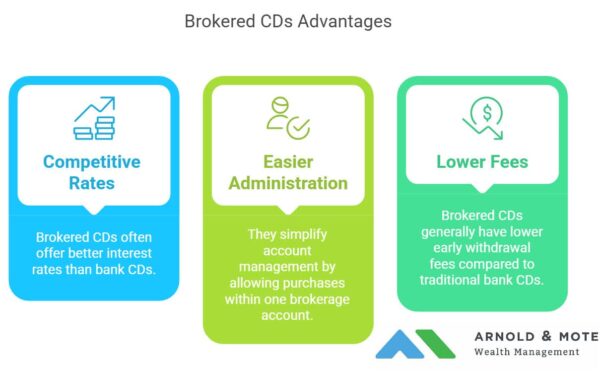Let's Get Started
You'll get the most value from financial planning if your specific goals and needs match a firm's philosophy and services. Let's learn more about each other.
Ready to Get Started?


Brokered CDs often offer higher rates and easier management than traditional bank CDs, while still keeping funds under FDIC protection.
The main risk of brokered CDs is selling early, since you may have to accept less than you paid if interest rates rise or buyers are scarce.
Both options have pros and cons, so the right choice depends on your need for flexibility, tax situation, and overall cash management plan.
Certificates of Deposit (CDs) have long been a popular choice for savers seeking a secure investment for their cash, but with a higher interest rate than a checking or savings account. While traditional bank-issued CDs have been a go-to option, brokered CDs have gained increasing popularity among investors looking for greater diversity and potentially higher returns within their fixed-income portfolios. In this article and video, we look into the the distinct advantages and drawbacks of brokered CDs and traditional bank CDs.

First, the interest rates on brokered CDs are generally much more competitive than bank CDs. CDs available at your brokerage are sourced from banks across the country, and allow you to very easily shop CD rates from banks everywhere. It is highly unlikely that your local bank or credit union is offering the most competitive rates in the country, so almost everyone can see an increase in the rates available to them by looking at brokered CDs.
Brokered CD interest rates available to our clients at Charles Schwab are kept up to date on their fixed income page. Compare this to the rate of return offered by your Bank’s CDs.
Next, brokered CDs are much easier to administer. Opening accounts at local banks means making trips across town, opening multiple accounts, and perhaps having to open accounts at multiple different banks to stay within the FDIC protection limit. Brokered CDs can be purchased in your current IRA, Roth IRA, or brokerage account – There’s no need to open up new accounts all over the place.
And, you can very easily just purchase CDs from different banks within your single brokerage account and keep everything under FDIC protection.
Lastly, brokered CDs generally have much less fees to break, or get your money back early, if needed. Traditional bank CDs will typically charge 3 months of interest as an early withdrawal penalty. For a $100,000 CD with 5% interest, this could mean $1,250 in penalty fees!
Brokered CDs typically have a trading fee of $1 per $1,000 in value, with a maximum fee of $250. Check these fees with your broker before purchasing, however this fee is pretty standard across the large brokerage firms like Vanguard, Charles Schwab, and Fidelity.
However, there are risks associated with brokered CDs. And one is related to needing to sell before maturity. If you need to get your money back from a brokered CD, you must find someone willing to buy it. Your broker will help you do this, but it may not be instantaneous and you may have to sell it for less than you originally paid for the CD. While there are no withdrawal penalties, you are at risk of no one being there to purchase your CD on the secondary market when you try and sell it.
You can lose principal in brokered CDs if you need to sell early.
If interest rates have risen from the time you originally purchased the CD to when you are looking to sell, you may lose principal on the sale. Likewise, if interest rates have declined, you could end up with an added profit.
Lastly, some brokered CDs are callable, which just means the bank can buy back your CD if there are more favorable interest rates for them. Be sure to look for non-callable brokered CDs if you want to be sure you are locking in your interest rate for the life of your CD.
Cash is an important part of any investment allocation. But you have a lot of options besides just purchasing CDs. Money market funds and Treasury Bills are two other very common alternatives to Bank CDs. And because of the tax treatment of CD interest, other options may be much more tax-efficient for those at a high marginal tax rate.
Cash management is just one of the many topics we help our clients with every day. And as flat fee investment advisors, our clients do not pay added fees for moving cash to their Schwab accounts for us to manage and help maximize their interest earnings.
Matt worked for the Department of Defense as a material scientist before changing careers to follow his interests in personal finance and investing. Matt has been quoted in The Wall Street Journal, CNBC, Kiplinger, and other nationally recognized finance publications as a flat fee advisor for Arnold and Mote Wealth Management, a flat fee, fiduciary financial planning firm serving individuals and families in Cedar Rapids and surrounding areas. He lives in North Liberty, where you will likely find him, his wife Jessica, and two kids walking their dog on a nice day. In his free time Matt is an avid reader, and is probably planning his next family vacation.